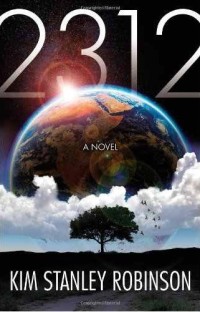
Published by Orbit on May 22, 2012
“Worldbuilding” has been a popular buzz word in the modern era of science fiction, and Kim Stanley Robinson has always scored points for his detailed construction of alien environments. In 2312, he turns his attention to asteroid building: asteroids are captured, hollowed out, fitted with propulsion systems, made into terraria that double as transport vehicles, and populated with animals like arks designed by futuristic Noahs. He also gives Mercury a city that travels on rails to avoid sunlight and imagines an Earth that has seen better days (particularly Florida, which is mostly underwater). Yet worldbuilding alone does not a successful novel make.
2312 gets off to a promising start as a terrarium designer and cutting edge artist named Swan Er Hong, rocked by the unexpected death of her elderly mentor Alex, discovers that Alex left her a message to be delivered to Wang Wei. Accompanied by Saturn’s liason, Wahrum, Swan travels to Io where she learns that Alex had a plan to revivify a moribund Earth. Alex was also worried that the quantum computers (qubes) that run everything appeared to be going rogue. Another of Alex’s friends, Inspector Genette, enlists Swan’s help as he tries to complete the investigation he started with Alex. On a visit to Earth, Swan arranges for a kid named Kiran to escape his dreary life (the reader knows, of course, that Kiran will eventually reappear and play a crucial role in the story) before she returns to Mercury, where either a natural disaster or (more likely) a devastating attack briefly energizes the novel.
The energy, unfortunately, fizzles out, reigniting in spurts from time to time but never sustaining. When the plot moves along -- when things happen -- 2312 is an imaginative and entertaining novel. When, for long stretches, nothing happens, 2312 is a mediocre novel. Most of the text in the initial three-quarters of the book does little to advance the plot. It’s a long slog through a deep bog to get to the final quarter where the story finally comes into focus.
Throughout his career, Robinson has demonstrated a tendency to explain his many thoughts -- ranging from physics and geology to economics and politics -- at length, resulting in novels that are needlessly wordy. That’s the primary fault that weakens 2312. I often had the impression that Robinson was worried that his plot would get in the way of his ideas so he relegated plot development to the last few chapters. I also had the impression that Robinson was more interested in showing off his considerable knowledge than in telling a tight, compelling story. Knowledge, like worldbuilding, is fine, but tedious discussions of seemingly random ideas that do little to advance the plot reflect a sort of self-indulgence that detracts from the novel.
Robinson doesn’t write with literary flair; sometimes, in fact, his prose reads like a dry textbook. Explanatory sections of the novel entitled “excerpts” are a thinly disguised excuse for the sort of expository pontification that kills a fictional narrative. Fortunately, most of them are mercifully short. Robinson also throws in a few meaningless lists (e.g., names of craters … who cares?). Breaking up the narrative with these frequent digressions seriously disrupts the story’s flow.
Swan is the only character with any personality at all. Robinson takes a stab at human emotion by putting Wahrum and Swan together, but the effort isn’t convincing, and the sex scenes (complicated by extra parts) are more silly than passionate. Robinson is clearly more comfortable with ideas than people.
For all the worldbuilding, Robinson is at his best when he focuses on Earth as it exists three hundred years from now. His vision is bleak but credibly grounded in environmental, political, and economic trends. Even here, however, his writing sometimes devolves into a scolding lecture. Some of his chapters would make excellent essays or editorials; as fiction, they too disconnected from plot or characterization to be riveting.
Alex’s creative version of a revolution and an imaginative means of launching an interstellar attack give the novel its best moments. A shorter, tighter novel that focused on those elements would have been a great read. As it stands, 2312 leaves the reader drowning in ideas and fails to deliver a truly engrossing story.
RECOMMENDED WITH RESERVATIONS